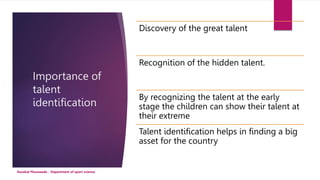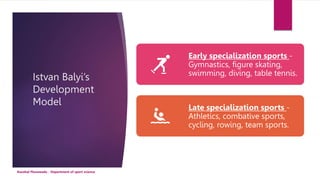1) Talent identification intro.pptx
- 1. Talent identification K.P.MANAWADU B.SC( SP├ēCIAL ) SPORTS SCIENCE & MANAGEMENT (USJP) Kaushal Manawadu - Department of sport science
- 2. Introduction Kaushal Manawadu - Department of sport science ’üĄ Coaching plays a significant role within the realm of talent identification. Infact, it Has been suggested that key issues within the talent identification stages include having "many highly qualified and well-educated coaches" and "a guarantee that these highly qualified and well-educated coaches can work with beginners and not only high-level athletes
- 3. ContŌĆ” ’üĄ There is no one correct model for talent identification and selection. It is dependent on the complexity of the sport (from a predictive perspective) and the infrastructure of the sport at a local, regional and national level. Kaushal Manawadu - Department of sport science
- 4. Talent Definition Kaushal Manawadu - Department of sport science Talent is the adequate aptitude or ability in one direction, above the normal average. Someone who has talent is able to do some thing without trying hard.
- 5. Importance of talent identification Kaushal Manawadu - Department of sport science Discovery of the great talent Recognition of the hidden talent. By recognizing the talent at the early stage the children can show their talent at their extreme Talent identification helps in finding a big asset for the country
- 6. Components of Talent Identification Kaushal Manawadu - Department of sport science The main components of Talent ID can be divided into the following categories: Physiological Physical Psychological Technical/Tactical Results Intangibles
- 7. Stages of pursuit of excellence Kaushal Manawadu - Department of sport science 1. TALENT DETECTION Discovery of potential performers who are not currently involved in the sport in question ŌĆó 2. TALENT IDENTIFICATION Recognizing current participants with the potential to become elite performers. ŌĆó 3. TALENT DEVELOPMENT Providing athletes with a suitable learning environment so that talent can be realized ŌĆó 4. TALENT SELECTION Ongoing process of identifying at various stages -ŌĆó individuals who demonstrate prerequisite levels of performance.
- 8. Kaushal Manawadu - Department of sport science
- 9. WHAT IS TALENT IDENTIFICATION ? Kaushal Manawadu - Department of sport science Screening the athletes using selected tests to identify potential for success. Previous involvement NOT a prerequisite.
- 10. What is talent selection ? ’üĄ Screening of athletes currently participating in a sport using experienced coaches and/or selected tests to identify those most likely to succeed. Kaushal Manawadu - Department of sport science
- 11. What is talent development? Kaushal Manawadu - Department of sport science ’üĄ Providing Infrastructure to enable identified/selected athlete to develop full potential.
- 12. What is targeted recruitment? Kaushal Manawadu - Department of sport science ’üĄ Programmes that recruit talented athletes from locations where infrastructure is already in place.
- 13. Kaushal Manawadu - Department of sport science
- 14. Kaushal Manawadu - Department of sport science
- 15. How much of an athleteŌĆÖs performance potential can you measure in your sport? Kaushal Manawadu - Department of sport science ’üĄ Performance ’üĄ Anthropometrics ’üĄ Psycho-social ’üĄ Genetic (Muscle fiber type is estimated by Cybex testing and by muscle biopsy in early childhood to find the best suitable event for them in western countries)
- 16. Limitations of talent identification Kaushal Manawadu - Department of sport science
- 17. Implementations of new methods Kaushal Manawadu - Department of sport science
- 18. Istvan BalyiŌĆÖs Development Model Kaushal Manawadu - Department of sport science Early specialization sports - Gymnastics, figure skating, swimming, diving, table tennis. Late specialization sports - Athletics, combative sports, cycling, rowing, team sports.
- 19. Long-Term Athlete Development Kaushal Manawadu - Department of sport science A specific and well-planned training, competition and recovery regime will ensure optimum development throughout an athleteŌĆÖs career. Ultimately success comes from training and performing well over the long-term rather than winning in the short term. There is no short cut to success in athletic preparation.
- 20. Thank you!!! Kaushal Manawadu - Department of sport science



















